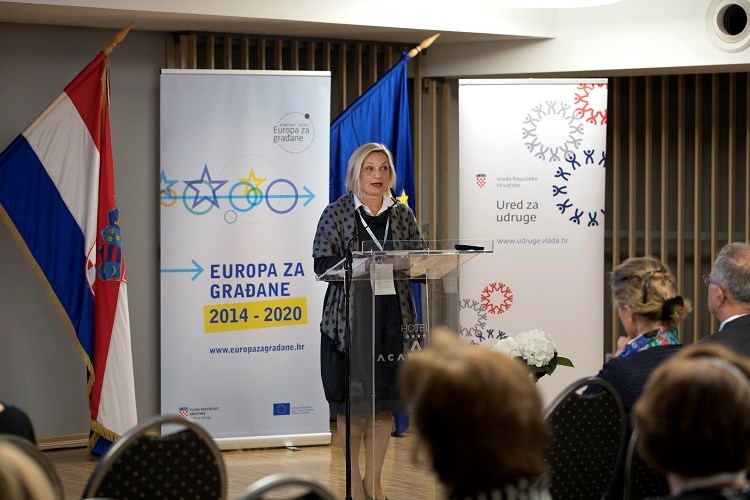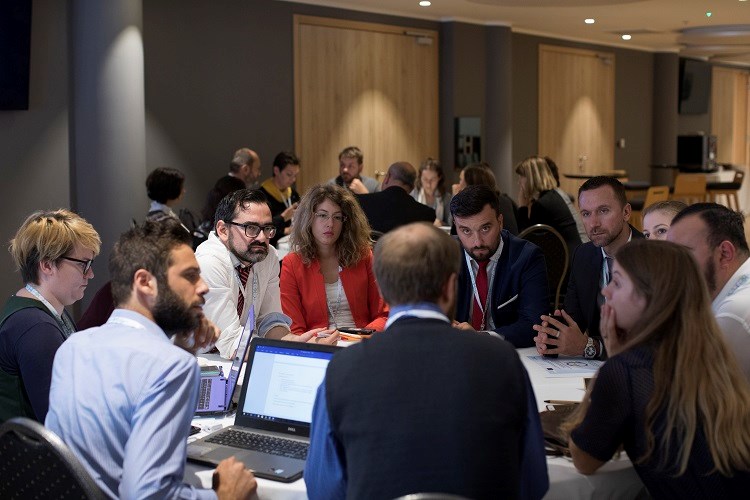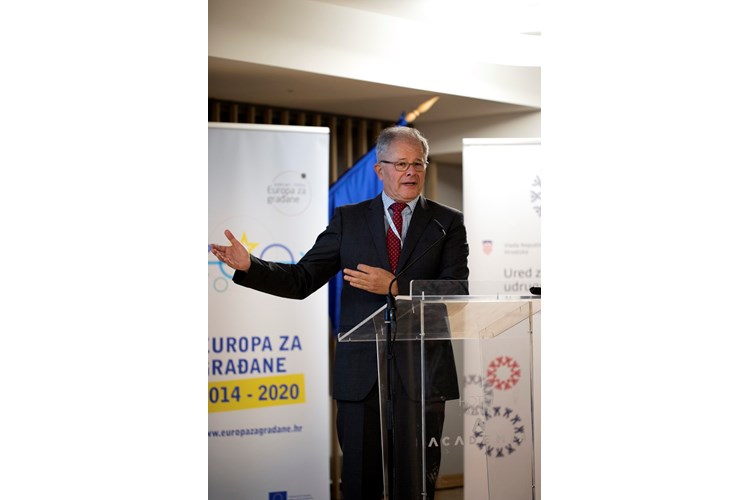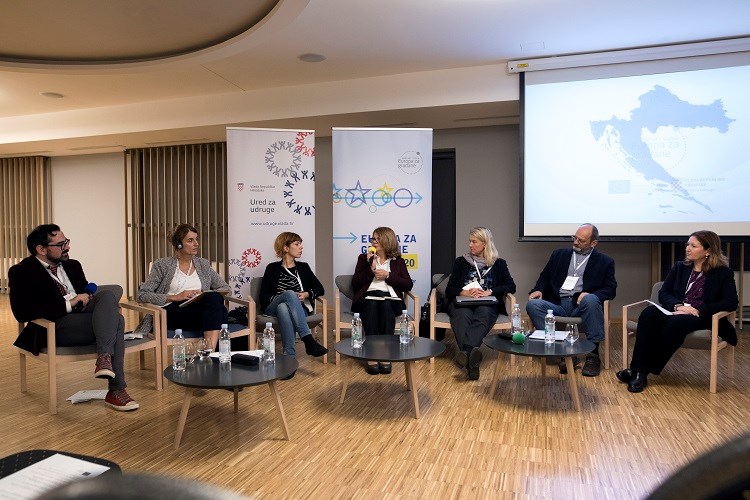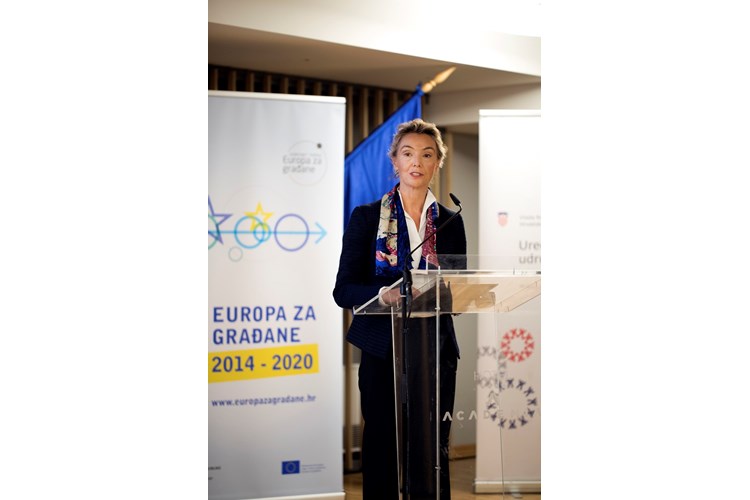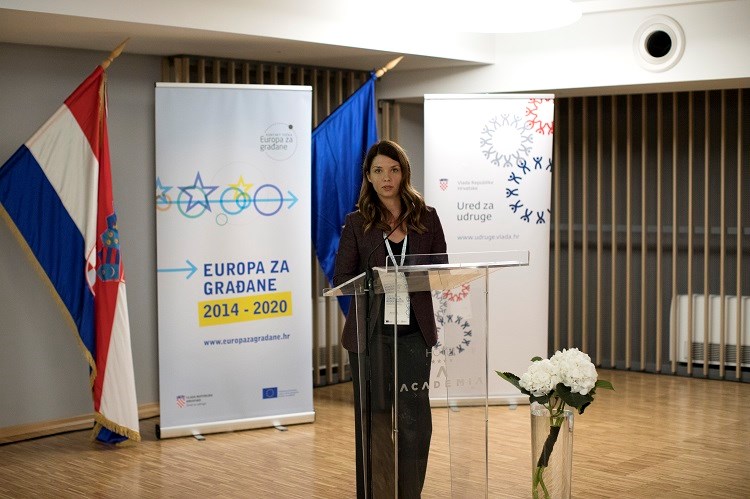- Published: 06.10.2017.
Conference “Europe for the Future!” held on the occasion of 10 years of Europe for Citizens Programme in Croatia
On 27th September 2017 the Office for the Cooperation with NGOs of the Government of the Republic of Croatia organized the conference “Europe for the Future!”, which marked the 10th anniversary of the implementation of the Europe for Citizens programme in Croatia.
This ceremonial conference was held in the Hotel Academia in Zagreb, and the program was attended by the representatives of the Croatian Government, representatives of the European Commission, members of the European Commission Representation in Croatia, members of the European Economic and Social Committee, representatives of state and public administration, delegations of the National Contact Points of the ‘Europe for Citizens’ Programme from other countries, numerous Croatian beneficiaries of the Europe for Citizens programme, representatives of civil society organizations and academic community. The conference was also an opportunity for the overview of the Programme’s achievements in the last ten years, but also for the discussion on its future developments and the key challenges in the development of the European Union and European Citizenship.In the welcome speech, the participants of the conference were addressed by Mrs. Vesna Lendić Kasalo, Authorized Head of Office, Mr. Branko Baričević, Head of European Commission Representation in Croatia and Mrs. Marija Pejčinović Burić, Deputy Prime Minister and Minister of Foreign and European Affairs of the Republic of Croatia. Mrs. Lendić Kasalo briefly reviewed the experiences and importance of the implementation of the Programme in Croatia, while Mr. Baričević introduced the participants of the conference to the content of the White Paper on the Future of Europe, highlighting in particular the conclusions of the possible 6th scenario proposed by the European Commission President Jean-Claude Juncker in his State of the Union speech . On behalf of the Government, Mrs. Pejčinović Burić supported the further development of the Europe for Citizens Programme and emphasized its importance in building and strengthening the European society.
After the welcoming words, the participants were shown a short film titled "Our Contribution to Better Europe", featured for the occasion of the 10th anniversary of the Programme in Croatia, followed by the presentation of Ms Maja Tomičić, Head of the National Contact Point of the Europe for Citizens Programme in Croatia, operated by the Office for the Cooperation with NGOs of the Government of the Republic of Croatia over the last ten years. In her presentation , Ms Tomičić emphasized that, in the last ten years, the Croatian beneficiaries (civil society organizations, municipalities, towns and one county) implemented 101 projects with the total value over 4,3 million euros. More than 560 organizations from Croatia participated in the implementation of the projects of the other countries parties to the Programme, while the Croatian National Contact Point organized over 120 events with the purpose of informing and consulting potential project applicants. In addition, she informed the participants about the ongoing process of the evaluation of the Programme implementation at the European level, and the beginning of the process of collecting ideas for the structure and priorities of the Programme for the next 2021-2027 financial period.
After the ceremonial part, the conference continued with its working agenda, which was structured in two sections: the panel discussion on the topic of “The European Union - a community of active and solidary citizens” and the Chat Points - group discussions on the future of the European Union.
The participants in the panel discussion were Ms. Jutta Koenig-Georgiades, from DG Migration and Home Affairs, European Commission, Ms. Vedrana Baričević from the Center for the Study of Ethnicity, Citizenship and Migration (CEDIM), Faculty of Political Science, Ms. Nives Ivelja, from the Association „MI” Split, Ms. Vesna Teršelič, from the association “Documenta”, Mr. Toni Vidan as a representative of the European Economic and Social Committee and Ms. Antonija Gladović, Head of the Agency for Mobility and EU Programmes. The panel discussion opened numerous questions which served as the introduction for the later group discussions at the Chat Points.
Ms. Koenig-Georgiades compared the challenges the Programme had at the time of its launch with the challenges it faces in the coming Programming period. Ms. Vedrana Baričević presented the key findings of the FP7 project “bEUcitizen”, and she emphasized that the focus of the mainstream discussions on EU citizenship are often on the mobility related rights, while the EU citizenship rights of the less mobile citizens from the member states are not sufficiently recognized at the national level. Ms. Nives Ivelja made a remark on the importance of the volunteering and the civil society sector in forced migration integration policies, while Ms. Teršelič put a special emphasis on the importance of the policies of remembrance for the EU identity building. Mr Toni Vidan offered critical remarks on the White Paper and 6th scenario for Europe, proposed by President Juncker. He also informed the audience about the 6th possible scenario proposed by the civil society organizations . The main criticism expressed by Mr. Vidan referred to the neglect of issues of environment and sustainable development in President Juncker’s State of the Union speech. During the panel discussion, Head of the Agency for Mobility and EU Programmes, Ms. Antonija Gladović, informed the participants about the volunteering, apprenticeship and traineeship opportunities in the European area available for the youth within the European Solidarity Corps initiative . The panel discussion was moderated by Mr. Viktor Koska, Senior Expert Adviser at the Office for the Cooperation with NGOs of the Government of the Republic of Croatia.
The discussions started during the panel continued in the Chat points, where in the group discussions organized on five chairs (each named by a particular European town or city), the conference participants were given an opportunity to engage more actively in the conversations on the key topics of the Europe for Citizens Programme. Hence, the chair “Lampedusa” offered the venue for the discussion on volunteer services in times of refugee crisis; the chair “Sofia” was oriented toward obstacles on the path to the European citizenship; the chair “Zagreb” focused on the policies of remembrance and the EU identity building; the chair “Brussels” on the 6th scenario as the answer to the White Paper on the Future of Europe, while at the fifth chair “Strasbourg” the participants discussed on the importance and further development of the Europe for Citizens Programme.
During the fruitful discussions in the group sessions, the participants came to numerous valuable insights and conclusions. However, the following can be identified as the key conclusions of the conference “Europe for the Future”:
firstly, political processes in EU are marked by a low level of citizens’ trust in European institutions and political processes, and this gap can be reduced primarily through strengthening of active citizenship and increased citizens’ participation in decision making processes and civil society activities, both at the national and EU level. In this regard, it is necessary to make closer links between the European programmes and the citizens, and to foster local communities to implement programmes and participate in the European citizenship. The Croatian institutional framework for civil society support can serve as an example of good practice and hence, during the Croatian Presidency in 2020, its model should be promoted at the EU level, as well. Secondly, the European Union is faced with challenges regarding the development of the European identity. On the one hand these challenges stem from the increased migratory movements, especially those of forced migrants, while on the other, it is contested by different interpretations of the recent past. In dealing with both challenges, civil society may have a prominent role, and the utilization of the findings of the Europe for Citizens Programme can be directed towards strengthening of the networks between cities and civil society organizations in order to establish a better framework for the development of integration policies and an open dialogue as part of the remembrance policies
Finally, the participants agreed that, on the road towards the accomplishment of these goals, the Europe for Citizens Programme can and need to be an important tool. However, it is desirable to provide greater funding for the Programme budget, encourage the application of a large number of quality projects and, finally, to promote its ideas and aims by motivating different profiles of organizations and users to participate in the Europe for Citizens Programme.
.jpg?width=750&height=500&mode=crop)
